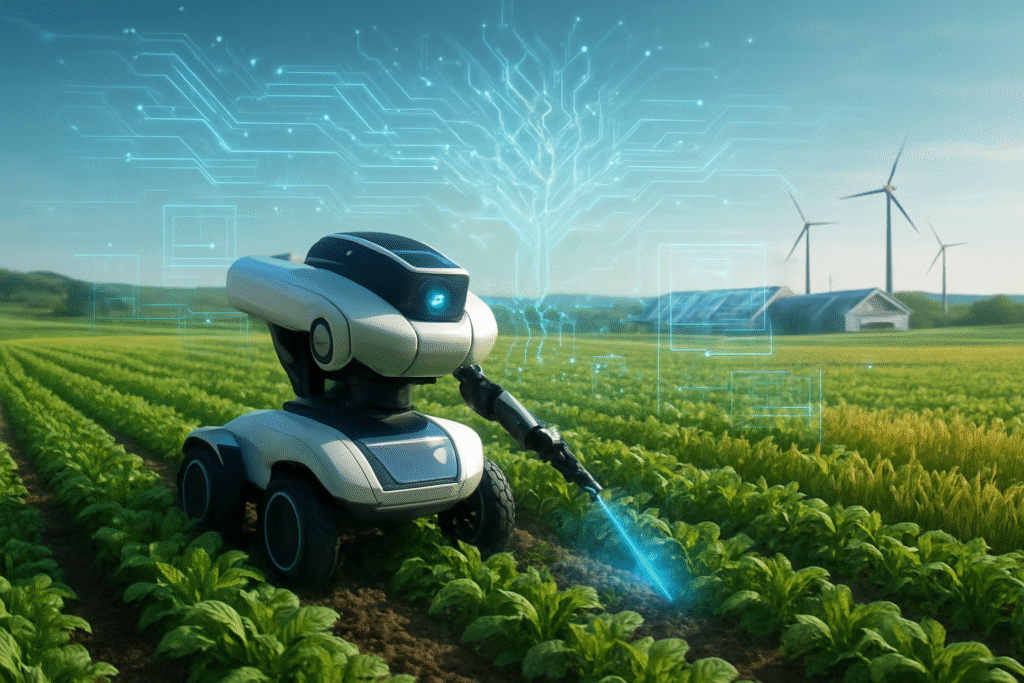
The agricultural sector is on the cusp of a profound transformation, driven by an influx of cutting-edge technological solutions emerging from industry leaders. Recent Organic Grower Summits have served as a critical showcase for these advancements, highlighting how artificial intelligence (AI), robotics, and precision agriculture are poised to revolutionize farming practices, enhance sustainability, and address long-standing challenges in food production. These innovations promise not only to optimize yields and reduce costs but also to significantly lessen the environmental footprint of agriculture, marking a new era for growers worldwide.
The immediate significance of these developments lies in their potential to fundamentally alter how food is grown, particularly in the organic sector where sustainable and precise methods are paramount. By integrating sophisticated AI and robotic systems, farmers can achieve unprecedented levels of efficiency and accuracy, moving away from broad-spectrum interventions towards highly targeted, plant-level care. This shift is not merely an incremental improvement but a paradigm change, offering tangible benefits from increased profitability for growers to a healthier planet for all.
Technical Deep Dive: Precision at the Plant Level
At the forefront of this agricultural revolution are remarkable technical advancements that leverage AI and machine learning to perform tasks with unparalleled precision. Two standout examples from recent summits are Carbon Robotics' LaserWeeder and Niqo Robotics' Niqo Sense AI camera.
Carbon Robotics has introduced its LaserWeeder technology, an AI-powered robotic system designed to autonomously identify and eliminate weeds using high-power lasers. The second-generation LaserWeeder G2, for instance, is equipped with 24 diode lasers and 36 high-resolution cameras, all managed by an onboard supercomputer. This sophisticated setup allows it to process up to 10,000 weeds per minute with sub-millimeter accuracy. The system employs advanced computer vision and deep learning algorithms to distinguish between crops and weeds, ensuring only unwanted plants are targeted. This approach drastically reduces the need for manual weeding, which is labor-intensive and costly, and minimizes the use of chemical herbicides, a significant benefit for organic farming and environmental health. Unlike traditional mechanical weeding, which can disturb soil and damage crops, or chemical spraying, which has ecological consequences, laser weeding offers a non-contact, highly selective, and environmentally benign solution. Initial reactions from the agricultural community have been overwhelmingly positive, with growers reporting substantial reductions in weed control costs and improved crop quality.
Similarly, Niqo Robotics is making strides in precision spraying with its proprietary Niqo Sense AI camera. This technology enables spot spraying of agrochemicals—including pesticides, herbicides, fungicides, and liquid fertilizers—directly at the plant level. By precisely identifying individual plants and their needs, the Niqo Sense system ensures that chemicals are applied only where and when necessary, rather than broadcast across entire fields. This targeted application significantly reduces the overall volume of agrochemicals used, leading to substantial cost savings for farmers and a dramatic reduction in environmental pollution. This differs from previous approaches that relied on uniform application, often leading to chemical waste and runoff. Industry experts view this as a crucial step towards truly sustainable agriculture, allowing for effective pest and disease management with minimal ecological impact.
Corporate Landscape: Beneficiaries and Competitive Edge
These AI-driven agricultural solutions are poised to significantly impact a range of companies, from innovative startups to established agribusiness giants. Companies like Carbon Robotics and Niqo Robotics stand to benefit immensely, solidifying their positions as leaders in agricultural robotics and AI. Their proprietary technologies offer a significant competitive advantage, potentially disrupting traditional methods of weed control and crop protection.
The competitive landscape for major AI labs and tech companies is also shifting. While these specific solutions are currently offered by specialized ag-tech firms, the underlying AI and machine learning capabilities represent a lucrative area for broader tech giants to invest in or acquire. Companies like Wilbur-Ellis Agribusiness, a prominent player in agricultural solutions, are already partnering with growers to deliver tailored solutions in water management, resistance management, and soil health, demonstrating their strategic focus on integrating advanced technologies and sustainable practices. Other notable companies exhibiting at summits, such as Monarch Tractor (focusing on electric, autonomous tractors) and IntelliCulture (providing sustainable innovations), are also well-positioned to capitalize on the growing demand for smart farming tools.
These developments could potentially disrupt existing product lines for companies heavily invested in conventional agricultural machinery and chemical inputs, pushing them to innovate or risk losing market share. The strategic advantage lies with companies that can seamlessly integrate AI, robotics, and data analytics to offer comprehensive, sustainable, and efficient farming solutions. Market positioning will increasingly favor those who can provide verifiable environmental benefits alongside economic returns for growers.
Wider Significance: A Shift Towards Intelligent Agriculture
The emergence of these cutting-edge solutions fits perfectly into the broader AI landscape and the accelerating trend towards intelligent automation across industries. In agriculture, this translates to a profound shift towards precision agriculture and regenerative farming, where data-driven insights and automated systems guide decision-making and execution. These advancements are not isolated; they are part of a larger movement to optimize resource utilization, enhance biodiversity, and build more resilient food systems.
The impacts are multi-faceted: economically, they offer growers a path to higher profitability through reduced input costs and improved yields; environmentally, they promise a significant reduction in chemical pollution, water consumption, and soil degradation. By enabling more efficient and sustainable practices, these technologies address critical global challenges such as food security and climate change. Potential concerns, however, include the initial capital investment required for these advanced systems, the need for robust connectivity in rural areas, and the potential for a widening digital divide among farmers. Comparisons to previous agricultural milestones, such as the Green Revolution, highlight the transformative potential of AI. While the Green Revolution focused on high-yield crop varieties and synthetic inputs, the AI revolution emphasizes intelligence, precision, and sustainability, aiming for a more harmonious relationship between agriculture and the environment.
Future Developments: The Horizon of Autonomous Farms
Looking ahead, the trajectory of agricultural AI suggests an exciting future. Near-term developments are likely to include further refinement of existing technologies, with robots becoming even more adept at complex tasks, and AI systems offering more granular and predictive insights. We can expect to see enhanced integration of various smart farming tools, creating holistic, interconnected farm management systems.
On the horizon, potential applications and use cases are vast. Fully autonomous farms, where AI-powered robots handle everything from planting and monitoring to harvesting and pest control, are no longer science fiction. AI will play an increasingly critical role in climate-resilient agriculture, predicting weather patterns, optimizing irrigation schedules in response to drought, and identifying disease outbreaks before they become widespread. Challenges that need to be addressed include developing robust and affordable solutions for small and medium-sized farms, ensuring data privacy and security, and fostering a skilled workforce capable of operating and maintaining these advanced systems. Experts predict a future where agriculture is not just more efficient, but also more sustainable, adaptable, and responsive to global demands, with AI as the central nervous system of modern farming.
Comprehensive Wrap-Up: A New Era for Food Production
In summary, the cutting-edge AI and robotic solutions showcased by industry leaders at events like the Organic Grower Summit represent a pivotal moment in agricultural history. Key takeaways include the dramatic improvements in precision, efficiency, and sustainability offered by technologies such as AI-powered laser weeding and spot spraying. These developments are not just incremental improvements; they are foundational shifts that will redefine farming practices for decades to come.
The significance of this development in AI history cannot be overstated. It demonstrates AI's practical application in a critical sector, moving beyond theoretical models to deliver tangible, real-world benefits. The long-term impact will likely include a more resilient food supply, reduced environmental harm, and increased economic viability for farmers, especially those committed to organic and sustainable methods. As we move forward, it will be crucial to watch for further integration of these technologies, the emergence of new AI-driven solutions, and how policymakers and industry stakeholders collaborate to ensure equitable access and training for all growers. The future of food production is becoming intelligently automated, precise, and profoundly sustainable.
This content is intended for informational purposes only and represents analysis of current AI developments.
TokenRing AI delivers enterprise-grade solutions for multi-agent AI workflow orchestration, AI-powered development tools, and seamless remote collaboration platforms.
For more information, visit https://www.tokenring.ai/.






